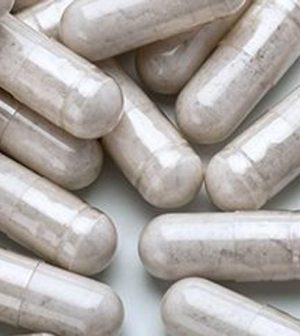- Could Artificial Sweeteners Be Aging the Brain Faster?
- Techniques for Soothing Your Nervous System
- Does the Water in Your House Smell Funny? Here’s Why
- Can a Daily Dose of Apple Cider Vinegar Actually Aid Weight Loss?
- 6 Health Beverages That Can Actually Spike Your Blood Sugar
- Treatment Options for Social Anxiety Disorder
- Understanding the Connection Between Anxiety and Depression
- How Daily Prunes Can Influence Cholesterol and Inflammation
- When to Take B12 for Better Absorption and Energy
- Epsom Salts: Health Benefits and Uses
Vitamins, Supplements Don’t Guard Against Severe COVID

Remember when everyone was downing zinc supplements at the beginning of the pandemic, in hopes of guarding against a severe case of COVID-19?
New research suggests that folks may have wasted their time and effort: Taking zinc, vitamin C or vitamin D supplements doesn’t lower one’s risk of dying from COVID-19.
“A lot of people have this misconception that if you load up on zinc, vitamin D or vitamin C, it can help the clinical outcome of COVID-19,” but that “hasn’t been shown to be true,” said lead study author Dr. Azizullah Beran, an internal medicine resident at the University of Toledo’s College of Medicine and Life Sciences in Ohio.
Beran and his colleagues analyzed 26 peer-reviewed studies that were conducted worldwide and included more than 5,600 hospitalized COVID-19 patients.
Those treated with vitamin D, vitamin C or zinc did not have a lower risk of death than those who didn’t receive the supplements.
And while vitamin D was associated with lower rates of being put on a ventilator and shorter hospital stays, more rigorous research is needed to confirm that finding, according to the study authors.
They also analyzed a small subset of patients who had been taking vitamin D before infection with the coronavirus, and found no lower risk of death in that group.
“It’s important for people to understand that taking a lot of these supplements does not translate into better outcomes,” said study senior author Dr. Ragheb Assaly, a professor of medicine at the University of Toledo.
“The other important message is that the answer to this disease is the vaccine,” Assaly said in a university news release. “Micronutrient supplements will not offset the lack of vaccination or make you not need the vaccine.”
It’s possible that some COVID-19 patients who are malnourished may benefit from taking supplements, but that’s because their bodies already lack essential nutrients, not because vitamin D or vitamin C are effective against the virus, the researchers noted.
“What we’re saying is this: If you don’t medically need these supplements, don’t take them thinking they’re protective against COVID-19,” Beran said in the release. “They’re not going to prevent you from getting it and they’re not going to prevent you from dying.”
The findings were published recently in the journal Clinical Nutrition ESPEN.
More information
For more on COVID-19 treatments, see the U.S. Centers for Disease Control and Prevention.
SOURCE: University of Toledo, news release, Feb. 17, 2022
Source: HealthDay
Copyright © 2026 HealthDay. All rights reserved.










